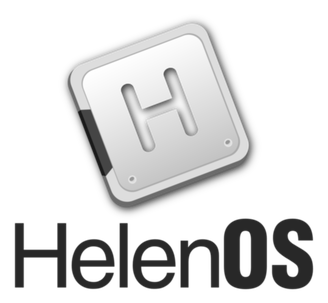HelenOS
 | |
| OS family | Experimental |
|---|---|
| Working state | Current |
| Source model | Open Source |
| Latest release | 0.4.0 / Feb 14 2009 |
| Repository | |
| Platforms | i386, AMD64, SPARC64, ia64, PowerPC, ARM architecture, MIPS |
| Kernel type | Microkernel |
| License | BSD |
| Official website | www.helenos.org |
HelenOS is an operating system based on a preemptible microkernel design. The source code of HelenOS is published under free software licences, making the operating system free software.
Features
HelenOS is based on a microkernel design. It is fully preemptible. It provides all the facilities expected of a modern kernel, including multitasking, multithreading, and symmetric multiprocessing, but is small and easy to expand. Particular features of HelenOS are: lightweight IPC, thread-local storage, and user-space managed fibrils.
Development
HelenOS is developed mainly by staff and students at the Faculty of Mathematics and Physics at Charles University in Prague, with help from other contributors around the world.
Available ports
HelenOS has been ported to run on many different computer architectures including ARM, AMD64 (x86-64), IA32, IA64 (Itanium), MIPS, PowerPC (32-bit only), and sparc64. There are also incomplete ports to 64-bit PowerPC and the Xen hypervisor paravirtualization environment on IA32.
Source-code licensing
The source code of HelenOS is published under the BSD licence, while some third-party components are available under the GNU General Public License, and others are public domain. Both of these licences are free software licences, making HelenOS free software.
Research use
HelenOS is used for research in the area of creating a fully componentized operating system and implementing an object-oriented filesystem.
